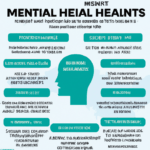Mental health issues continue to be a significant concern in today’s society. Whether it’s depression, anxiety, bipolar disorder, or other conditions, these issues affect millions of people worldwide. The impact of mental health problems can be far-reaching, affecting not only individuals but also their families, communities, and society as a whole. Understanding the complexity and nuances of mental health is crucial for promoting awareness, empathy, and support. By exploring the causes, symptoms, treatment options, and destigmatizing conversations around mental health, we can strive to create a more inclusive and supportive environment for those facing these challenges.
Mental health issues are prevalent and impactful conditions that affect individuals across the globe. They encompass a wide range of disorders that significantly impact a person’s thoughts, emotions, and behavior. These conditions encompass various categories such as anxiety disorders, mood disorders, psychotic disorders, eating disorders, and personality disorders.
Anxiety disorders are characterized by excessive worrying, fear, and uneasiness. They include conditions like generalized anxiety disorder, panic disorder, social anxiety disorder, and specific phobias. Individuals with anxiety disorders often experience physical symptoms such as increased heart rate, sweating, and shortness of breath.
Mood disorders, such as major depressive disorder and bipolar disorder, significantly affect an individual’s emotions and overall mood. Depression is characterized by persistent sadness, loss of interest, and a lack of energy, while bipolar disorder involves extreme mood swings between depressive and manic episodes.
Psychotic disorders, such as schizophrenia, involve a loss of touch with reality. People with these disorders may experience hallucinations, delusions, disorganized thinking, and social withdrawal.
Eating disorders, including anorexia nervosa, bulimia nervosa, and binge eating disorder, involve severe disturbances in eating behaviors, body image dissatisfaction, and an unhealthy preoccupation with weight and shape.
Personality disorders, like borderline personality disorder and antisocial personality disorder, are characterized by rigid and unhealthy patterns of thinking, feeling, and behaving that cause significant distress in relationships and daily functioning.
Addressing mental health issues requires a comprehensive approach involving therapy, medication, and support systems. Increasing awareness and reducing stigma surrounding mental health are crucial steps that can lead to better understanding, access to care, and improved outcomes for individuals facing these challenges. Mental health issues affect millions worldwide, highlighting the need for ongoing research, support, and effective treatments.
Causes of mental health issues
Causes of mental health issues can be multifaceted and influenced by a combination of various factors. It is important to understand that mental health issues are complex and can arise from a range of different causes, including biological, psychological, and environmental factors. Below, we explore some of the common causes of mental health issues:
1. Genetics and family history: Research suggests that certain mental health conditions can be hereditary. If you have a family history of mental health issues, you may have an increased risk of developing similar conditions.
2. Brain chemistry and structure: Imbalances in brain chemicals, such as neurotransmitters, can contribute to the development of mental health issues. Additionally, abnormalities or changes in the brain structure can impact emotions, behaviors, and cognitive function.
3. Traumatic experiences: Past traumatic events, such as physical or emotional abuse, neglect, or witnessing a distressing incident, can significantly impact mental health. Trauma can lead to conditions like post-traumatic stress disorder (PTSD), anxiety disorders, and depression.
4. Substance abuse: Frequently engaging in substance abuse or addiction can exacerbate mental health conditions or even trigger them. Alcohol and drug abuse can disrupt the brain’s natural chemistry and contribute to the development of mental health issues.
5. Environmental factors: Various environmental factors can play a role in mental health issues. These include exposure to chronic stress, poverty, discrimination, violence, and social isolation. Difficult living conditions or lack of social support can increase the likelihood of developing mental health problems.
6. Physical health conditions: Certain physical health conditions, such as chronic pain, autoimmune disorders, hormonal imbalances, or neurological diseases, can impact mental well-being. The presence of these conditions can increase the risk of developing mental health issues.
7. Childhood experiences: Adverse experiences during childhood, such as neglect, abuse, or parental loss, can have a long-lasting impact on mental health. Early life stressors can influence brain development and increase vulnerability to mental health problems later in life.
8. Hormonal changes: Fluctuations in hormone levels, such as those occurring during puberty, pregnancy, or menopause, can influence emotional well-being and contribute to the development of mental health issues.
9. Social and cultural factors: Societal and cultural expectations, societal stigma, and limited access to mental health services can all have an impact on mental health. These factors can contribute to feelings of shame, guilt, and isolation, making it more likely for mental health problems to manifest or go untreated.
10. Personality traits and coping abilities: Certain personality traits, such as having low self-esteem, perfectionism, or being prone to negative thinking, can increase the risk of developing mental health issues. Additionally, limited coping skills or poor stress management techniques may make individuals more susceptible to mental health challenges.
It is essential to note that mental health issues are unique to each individual, and the interplay of these causes can vary from person to person. Seeking professional help is crucial for accurate diagnosis, treatment, and support.
Common types of mental health disorders
Common types of mental health disorders include anxiety disorders, mood disorders, psychotic disorders, eating disorders, and personality disorders.
Anxiety disorders are characterized by excessive worry or fear that can significantly impact a person’s daily life. Some of the most common anxiety disorders include generalized anxiety disorder (GAD), panic disorder, social anxiety disorder, and phobias. People with anxiety disorders may experience symptoms such as restlessness, irritability, difficulty concentrating, muscle tension, and sleep disturbances.
Mood disorders, also known as affective disorders, involve persistent emotional disturbances. The most well-known mood disorder is depression, which is characterized by feelings of sadness, hopelessness, and loss of interest or pleasure in activities. Bipolar disorder, on the other hand, involves cycling between episodes of depression and manic or hypomanic episodes, during which individuals may experience elevated moods, increased energy, impulsivity, and racing thoughts.
Psychotic disorders are severe mental health disorders that cause abnormal thinking and perceptions. The most prominent of these disorders is schizophrenia, which is marked by delusions, hallucinations, disorganized thinking, and impaired social functioning. People with psychotic disorders often struggle with distinguishing between what is real and what is not.
Eating disorders are characterized by abnormal eating behaviors and a preoccupation with food and weight. The three main types of eating disorders are anorexia nervosa, bulimia nervosa, and binge eating disorder. Anorexia involves severe restriction of food intake and a distorted body image, while bulimia involves periods of bingeing followed by purging behaviors such as self-induced vomiting or excessive exercise. Binge eating disorder is characterized by recurrent episodes of uncontrollable overeating without compensatory behaviors.
Personality disorders are a group of mental health conditions that involve enduring patterns of thoughts, feelings, and behaviors that deviate from cultural norms. Examples of personality disorders include borderline personality disorder, antisocial personality disorder, and narcissistic personality disorder. People with personality disorders often struggle with sustaining stable relationships, regulating emotions, and developing a strong sense of self.
Understanding the common types of mental health disorders is important for promoting awareness, reducing stigma, and providing appropriate support and treatment for those who are affected. While these categories encompass a broad range of conditions, it is crucial to remember that each individual’s experience with mental health disorders may vary, and treatment should be tailored to meet their specific needs. Mental health disorders are treatable, and early intervention can significantly improve outcomes, providing hope for those affected by these conditions.
Impact of mental health issues on daily life
Impact of mental health issues on daily life:
Mental health issues can significantly impact daily life in numerous ways, affecting individuals’ overall well-being, relationships, productivity, and ability to engage in everyday activities. These issues can have a profound effect on various aspects of a person’s life, ranging from their physical health to their emotional and cognitive functioning.
One of the key areas impacted by mental health issues is a person’s ability to perform daily tasks and responsibilities. For individuals experiencing mental health problems, even the simplest of tasks can become overwhelming and challenging. Basic activities such as getting out of bed, taking care of personal hygiene, and preparing meals can feel like daunting obstacles. These difficulties can lead to a loss of productivity and a decline in overall functioning.
Mental health issues can also have a significant impact on an individual’s ability to maintain healthy relationships. Conditions such as depression, anxiety, and bipolar disorder can influence a person’s mood, behavior, and social interactions. This can lead to strained relationships with family and friends, as well as difficulties forming new connections. The isolation and loneliness often experienced by those with mental health issues can further exacerbate their condition, creating a vicious cycle.
Furthermore, mental health issues can affect one’s ability to concentrate, make decisions, and problem-solve effectively. Conditions like attention deficit hyperactivity disorder (ADHD) and various anxiety disorders can impair cognitive functioning, making it challenging to focus on tasks, retain information, and make sound judgments. This can hinder a person’s academic or professional performance, leading to feelings of frustration, underachievement, and decreased self-esteem.
The impact of mental health issues on daily life extends beyond just the individual and can also affect their support network. Family members, partners, and close friends often take on caregiving responsibilities, which may include assisting with daily activities, providing emotional support, and coordinating healthcare. This can place significant strain on relationships and may lead to caregiver burnout, especially if proper resources and support are lacking.
Physical health can also be affected by mental health issues. Conditions like depression and chronic stress have been linked to a variety of physical ailments, including cardiovascular problems, weakened immunity, digestive disorders, and difficulty managing chronic conditions. The physical symptoms associated with these mental health issues can further disrupt daily life, impairing physical functioning and causing additional distress.
In conclusion, mental health issues have a far-reaching impact on daily life. From impeding one’s ability to carry out daily tasks to affecting relationships, cognitive functioning, and physical health, these issues can be debilitating. It is crucial to prioritize mental health and ensure that individuals have access to appropriate support, treatment, and resources to help them navigate these challenges and regain a sense of well-being.
Treatment options for mental health disorders
Treatment options for mental health disorders:
When it comes to addressing mental health disorders, there are various treatment options available that aim to alleviate symptoms, improve overall well-being, and enhance quality of life. These treatment options can be tailored to individual needs and may include a combination of therapies, medications, lifestyle changes, and support systems.
1. Psychotherapy:
One of the most common treatment options is psychotherapy, also known as talk therapy. This form of therapy involves discussing thoughts, feelings, and behaviors with a trained mental health professional. Psychotherapy helps individuals gain insight into their mental health condition, develop coping strategies, and make positive changes in their lives. Different types of psychotherapy include cognitive-behavioral therapy (CBT), dialectical behavior therapy (DBT), and psychodynamic therapy.
2. Medications:
In some cases, medication may be prescribed alongside psychotherapy to manage and reduce symptoms of mental health disorders. Antidepressants, antianxiety medications, mood stabilizers, and antipsychotics are commonly used to treat various conditions. It is important to note that medication should be prescribed by a qualified healthcare professional and requires regular monitoring to ensure safety and effectiveness.
3. Alternative Therapies:
In addition to traditional therapies, alternative and complementary treatment options can also be considered. These may include art therapy, music therapy, dance therapy, yoga, and mindfulness-based practices. Such therapies provide a creative outlet, encourage emotional expression, and promote relaxation and stress reduction.
4. Support Groups:
Support groups can be highly beneficial for individuals with mental health disorders. They provide a safe space for people to share their experiences, gain support from others facing similar challenges, and learn from each other’s strategies for managing symptoms. Support groups can be facilitated by mental health professionals or organized by community organizations.
5. Lifestyle Changes:
Making positive lifestyle changes can greatly contribute to mental well-being and aid in the management of mental health disorders. This may involve adopting a healthy diet, regular exercise routine, getting enough sleep, reducing substance use, and establishing a stable daily routine. Simple self-care practices such as engaging in hobbies, practicing relaxation techniques, and maintaining a strong support network can also be immensely helpful.
6. Hospitalization:
In severe cases where immediate intervention is required, hospitalization may be necessary. Hospitalization ensures a safe and supportive environment for individuals experiencing a mental health crisis. It allows for 24/7 monitoring, stabilization, medication adjustments, and access to a team of healthcare professionals.
It is important to note that treatment options for mental health disorders may vary depending on the specific diagnosis, severity of symptoms, and individual needs. It is crucial to consult with a qualified mental health professional to determine the most appropriate treatment plan. Remember, mental health disorders can be managed effectively, and seeking help is a sign of strength and courage.
Stigma and misconceptions surrounding mental health
Stigma and misconceptions surrounding mental health are significant barriers that continue to hinder progress in understanding and addressing mental health issues. These deeply ingrained beliefs and societal attitudes contribute to the perpetuation of discrimination, and can prevent individuals from seeking the help and support they need.
One prevalent misconception surrounding mental health is the belief that mental illnesses are the result of personal weakness or a lack of character. This misconception reinforces the stigma associated with mental health and often leads to shame and self-blame among those affected. The reality, however, is that mental illnesses are complex and multifaceted conditions that arise from a combination of genetic, biological, environmental, and social factors.
Another misconception is the notion that people with mental health issues are inherently dangerous or violent. This stereotype not only perpetuates fear and misunderstanding but also reinforces discrimination against individuals living with mental illnesses. In truth, research consistently shows that individuals with mental illnesses are more likely to be victims of violence rather than perpetrators.
Additionally, the media often portrays mental health issues in a sensationalized manner, which can further contribute to misconceptions. Movies, television shows, and news outlets frequently depict individuals with mental illnesses as unpredictable, violent, and “crazy.” These misrepresentations perpetuate stigmatizing beliefs and fail to accurately represent the diversity of experiences among those living with mental health conditions.
Another aspect of the stigma surrounding mental health is the idea that seeking treatment or therapy is a sign of weakness. This perception prevents many individuals from seeking help, as they fear being judged, labeled, or viewed as incapable. It is crucial to challenge this misconception and promote the notion that seeking support is a brave and necessary step towards recovery and well-being.
To combat stigma and misconceptions surrounding mental health, education and awareness are essential. It is crucial to disseminate accurate information, challenge stereotypes, and promote a culture of compassion and understanding. By fostering open and inclusive conversations, we can work towards breaking down the barriers that prevent individuals from accessing the support and care they deserve.
In conclusion, stigma and misconceptions surrounding mental health continue to be significant challenges that hinder progress in addressing mental health issues. By challenging and dismantling these deeply ingrained beliefs, we can create a more inclusive society that supports and empowers individuals living with mental health conditions.













